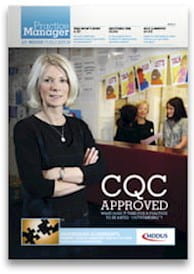TIME flies like an arrow...and, according to Groucho Marx, fruit flies like a banana. Even if we don’t appreciate the joke, we can probably all sympathise with that feeling of time speeding by too fast for us to do all the things we need to do. We even talk of “time management” as if it can be managed, perhaps even slowed down. Unfortunately, it cannot.
Time simply is an inelastic, non-negotiable 24 hours a day, and not a minute more. We cannot find time that is not already there, and we cannot make time, even with wishful thinking. The time famine we then experience brings with it anxiety and enough stress to spoil a job we might otherwise enjoy.
Any busy professional feels this and none more so than those managing a modern primary care service. But if time cannot be managed, what can we do to solve this apparent shortage of time? The simple answer is that we must manage ourselves. Good time management is really about self-management – how we use the limited time we have most effectively – and that is all about the personal decisions we make on a daily basis.
WHAT ARE YOUR OBJECTIVES?
Much has been written about time management, but all the self-help wisdom in the world will not make you any more efficient unless you are willing to change what you do. What exactly we need to change and how we do it depends entirely on what we want to achieve, and that is where good time management must begin – with an honest appraisal of our objectives.
In any professional setting there will be a number of clearly set out goals, as well as others that are far from obvious. As an individual, you first need to look at your job and decide what needs to be done in the short, medium and long term to achieve your professional objectives. This will include what has to be done today, this week and this month, as well as those longer-term plans, such as gaining a new qualification, getting that promotion or even shifting careers. Whatever it is, it forms part of your selfappraisal and will help inform your objectives.
WHAT’S IMPORTANT?
Next we have to consider all the things we have on our plates and prioritise everything on that long to-do list. Some things we assign ourselves are undoubtedly important and will help us directly or indirectly to achieve our goals. But, other things, often many other things that we spend our time doing, neither contribute to the everyday workload nor to our longer-term ambitions.
As everything we do, every resource we expend, including our time, has an opportunity cost, we must carefully weigh up our actions. Put simply, if we spend our time doing one activity, we cannot use the same time on another – we get to use our limited time only once.
To help us deal with this, a simple, cheap but effective strategy is to keep a to-do quadrant rather than a to-do list. Draw a box and then with two more lines divide the box into four equal quadrants. The top left quadrant is where we place anything we have to do that is both important and urgent, the top-right quadrant is where we put the important but non-urgent, the bottom-left is where we put the nonimportant but urgent and the bottom-right is the home for the neither important nor urgent.
Anything that is placed in the important and urgent box needs to be done. Anything in the important but non-urgent box can be deferred. We should focus our energies on those things that are important, and by important we mean important and relevant to helping us achieve those professional goals, which may be as simple as getting today’s staff rota completed or as complex and long-term as helping us achieve that promotion within the next five years.
The bottom two boxes are where we place those things that are unimportant to us, but which are also either urgent or not. The unimportant but urgent should be delegated and the non-important and non-urgent should be dumped. This system of deciding, based on importance and urgency, whether something should be done, deferred, delegated or dumped will make much better use of your time. It will force you, as you make your to-do lists, to actively prioritise as you go and to recognise that some things should never have been on your list in the first place.
NEED A REBOOT?
There are many different strategies advocated as time-management tools but all should involve an appraisal of our personal goals and a prioritisation of the various tasks we think we need to do. If you feel your time management needs a reboot, try setting your goals and using a to-do quadrant to help you prioritise. You have a simple strategy that will cost you nothing and all that is needed is for you to put it into practice and hopefully reap the rewards.
And, of course, the best way to get something done is to start.
Dr Allan Gaw is a writer and educator in Glasgow
This page was correct at the time of publication. Any guidance is intended as general guidance for members only. If you are a member and need specific advice relating to your own circumstances, please contact one of our advisers.
Read more from this issue of Practice Manager

Save this article
Save this article to a list of favourite articles which members can access in their account.
Save to library